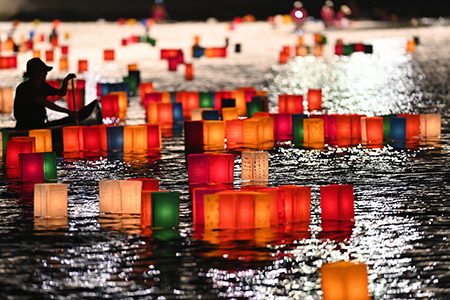"[Arms Control Today] has become indispensable! I think it is the combination of the critical period we are in and the quality of the product. I found myself reading the May issue from cover to cover."
Japan, on A-Bomb Anniversary, Recommits to Disarmament
September 2025
By Shizuka Kuramitsu
Japanese officials marked the 80th anniversary of the U.S. atomic bombing by reiterating their country’s long-standing commitment to a nuclear-weapon-free world, despite a growing domestic willingness to reconsider this policy.

Speaking Aug. 6 and Aug. 9, when the United States in 1945 attacked Hiroshima and then Nagasaki, Prime Minister Shigeru Ishiba reiterated Japan’s commitment to uphold the “three non-nuclear principles” and to “lead the efforts of the international community to bring about a world without nuclear war” and “a world without nuclear weapons.”
The two bombs, wielding a fraction of the power of today’s weapons, are roughly estimated to have killed around 215,000 people by the end of 1945.
“The widening of the division within the international community over approaches to nuclear disarmament has made the current security environment even more challenging. But that is exactly why we must make all-out efforts” toward disarmament, Ishiba added.
Under the 1960 U.S.-Japan Security Treaty, the United States committed to provide an extended deterrence to Japan by guaranteeing the use of U.S. military capabilities, including nuclear forces, to counter enemy threats.
Over the years, Japan and the United States have upgraded their alliance consultation and communications procedures related to extended deterrence. (See ACT, September 2024 and ACT, December 2024.)
More recently, the two countries have discussed scenarios involving the use of U.S. nuclear weapons in simulated contingencies involving Taiwan, Kyodo news agency reported July 26 and 27.
According to the reports, during their tabletop exercises, officials of Japan’s Self-Defense Force “repeatedly urged the U.S. force to make a nuclear threat” to counter a scenario in which China’s implied the use of nuclear weapons.
Recent polls suggest a slight shift among the Japanese population on the nuclear weapons issue. After a new 125-member Japanese lower house was elected July 20, a survey by Mainichi Shimbun showed that eight members support Japan’s acquisition of nuclear weapons. Although the number reflects a minority, it shows a shift from zero or one nuclear weapon supporter, which was a number recorded in the last survey in 2022, the newspaper reported.
Meanwhile, a member of the Japanese ruling party’s upper house and former deputy defense minister, Rui Matsukawa, in an interview with Reuters Aug. 20, “rais[ed] the possibility of Japan reducing its reliance on American security guarantees” and suggested that “Plan B is maybe [to] go independent, and then go [to] nukes.”
Reuters also reported that although “Support in Japan for developing its own indigenous atomic weapons is smaller [than South Korea] … interviews with a dozen Japanese lawmakers, government officials and former senior military figures reveal there is a growing willingness to loosen Japan’s decades-old pledge, formulated in 1967, not to produce, possess or host nuclear weapons in its territory—what is knowns as the three non-nuclear principles.”
Amid growing cynicism and some interests in exploring nuclear sharing and possession among the Japanese public, Hiroshima Governor Hidehiko Yuzaki warned in an Aug. 6 speech that “nuclear deterrence has not been safely sustained over the past 80 years, but has, at times, been on the brink of collapse.”
“Should nuclear deterrence fail someday, as suggested by historical evidence, and should nuclear war occur, it would be impossible to save the human race and the Earth from unrecoverable devastation,” Yuzaki said.
“What is the meaning of national security if it protects only the concept of a nation but has the possibility to lead unrecoverable end for its land and people?” he asked.
At the Aug. 9 ceremony, Nagasaki Mayor Shiro Suzuki called for “the government of Japan, the only nation to have suffered wartime atomic bombings… to firmly uphold the three non-nuclear principles.”
He also appealed to the leaders gathered in Nagasaki “to go back to the keystone values of the Charter of the United Nations, and restore multilateralism and the rule of law.”
He also noted that this year marks the 80th anniversary of the creation of the UN under the resolution to “save succeeding generations from the scourge of war.”
